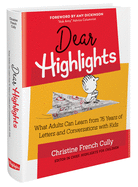
For the past 75 years, Highlights magazine has provided kids with entertaining and informative stories, puzzles, games and other activities to foster learning and spark children's creativity. One of the magazine's most popular features is its "Dear Highlights" column, where editors respond to letters, poems, drawings and (more recently) emails from young readers. But the responses aren't limited to the published ones: the Highlights editorial team answers every single piece of mail they receive. In Dear Highlights, editor-in-chief Christine French Cully collects dozens of pieces of correspondence from children, with accompanying essays reflecting on what she and her colleagues have learned from the kids who write to them. The result is a joyous, nuanced celebration of childhood, and a clarion call to adult readers to really listen to the children in their lives.
Dear Highlights is divided into broad categories, with letters addressing kids' concerns about family and friends, school challenges and dynamics, and how to figure out what (and whom) to be when they grow up. But the letters and replies also tackle difficult questions that many children face. "How can I be a supportive big sister and help my new sibling in a multiracial family?" Ashley wrote in 2011. K.D., whose parents had been separated for about a month in 1991, admitted, "Now my dad wants to come back. I'm not sure I want him back." Other letters deal with troubling historical events, such as the Challenger explosion or the attacks of September 11, 2001, the loss of pets or loved ones, and "Really Hard Things" like bullying, abuse and mental health struggles.
While their contents frequently address heavy subjects, the letters and the editors' responses are often infused with lightness. Readers' personalities shine through in the notes they send, such as a poem called "Hope" written by 13-year-old Kenneth in 1985. "I've seen hope in newspapers. I've listened to hope," he wrote. "HOPE IS EVERYWHERE." The editors seek to validate children's feelings and concerns, but always strive for a positive tone in their replies. They remind readers that they themselves, their families and friends, and other caring adults like teachers and school counselors have many resources at hand to solve their problems. They also call to mind the words of another adult who befriended many children: Fred Rogers, who famously advised his young TV viewers to "look for the helpers" when things seemed scary or sad. The Highlights editors, like Mr. Rogers, also encourage children to be the helpers.
The book includes a section about the Covid-19 pandemic, a unique event in the lives of Highlights readers as well as the magazine's editorial staff. As Cully notes, "For the first time, we were confronting many of the same emotions as our readers, at the same place in time. Our adult circumstances--working from home, being unable to socialize with friends, missing milestone events, and feeling bored--were very similar to their experiences." The staff empathized with readers like Sylvie, whose sixth birthday party was canceled because of the pandemic, or Makayla, who wrote, simply: "I miss my friends." They also assured readers that their parents, teachers and other adults (like scientists working to develop vaccines) were doing their best to keep everyone safe, and that production of the magazine would continue--no doubt a bright spot for bored kids in quarantine.
Written correspondence has its limits, Cully admits; letters and drawings rarely provide enough context to give a full picture of a child's concerns. Partly for this reason, in almost every response, the staff urges kids to seek out adults they can trust, whether they need help coming up with ideas to fill boring weekends or are troubled by deeper concerns. Notes and drawings about historical events, such as the assassination of President John F. Kennedy, are often a way for children to process their part in collective trauma and grief. In every case, the Highlights staff seeks to answer with respect, compassion and (where appropriate) sound advice. Sometimes, Cully notes, readers write back to share the results of following that advice, or to ask for help with additional problems.
Taken together, the letters and responses in Dear Highlights are a fascinating look at childhood over the past seven decades, and a testament to how kids' fundamental concerns--being loved, feeling safe and learning how to navigate the world--remain the same. Full of humor, sadness, frustration, joy and all the other emotions of childhood, the book stands as an important reminder that listening to children with empathy and respect can be the most powerful way to help them grow into confident, caring adults. --Katie Noah Gibson

